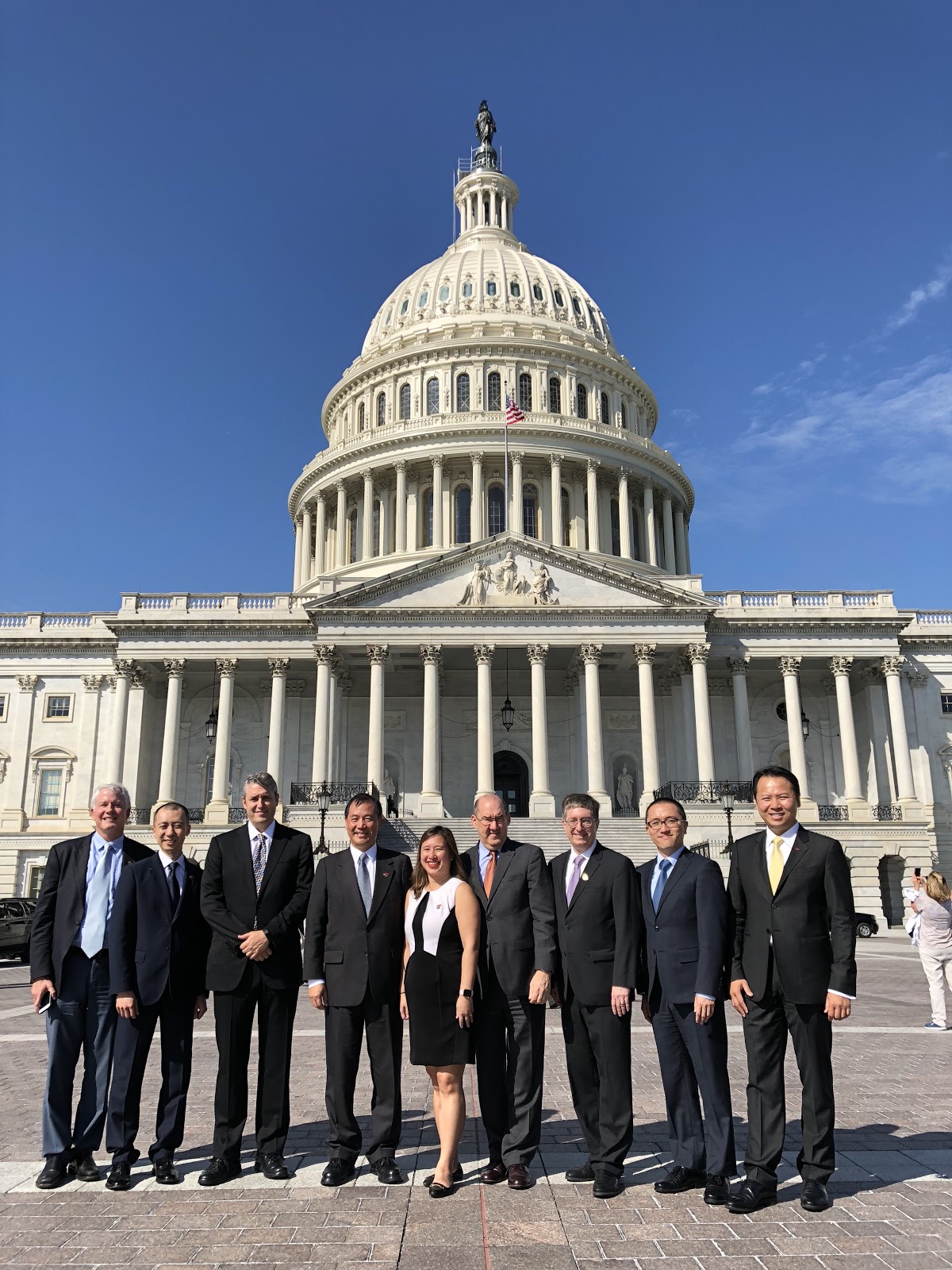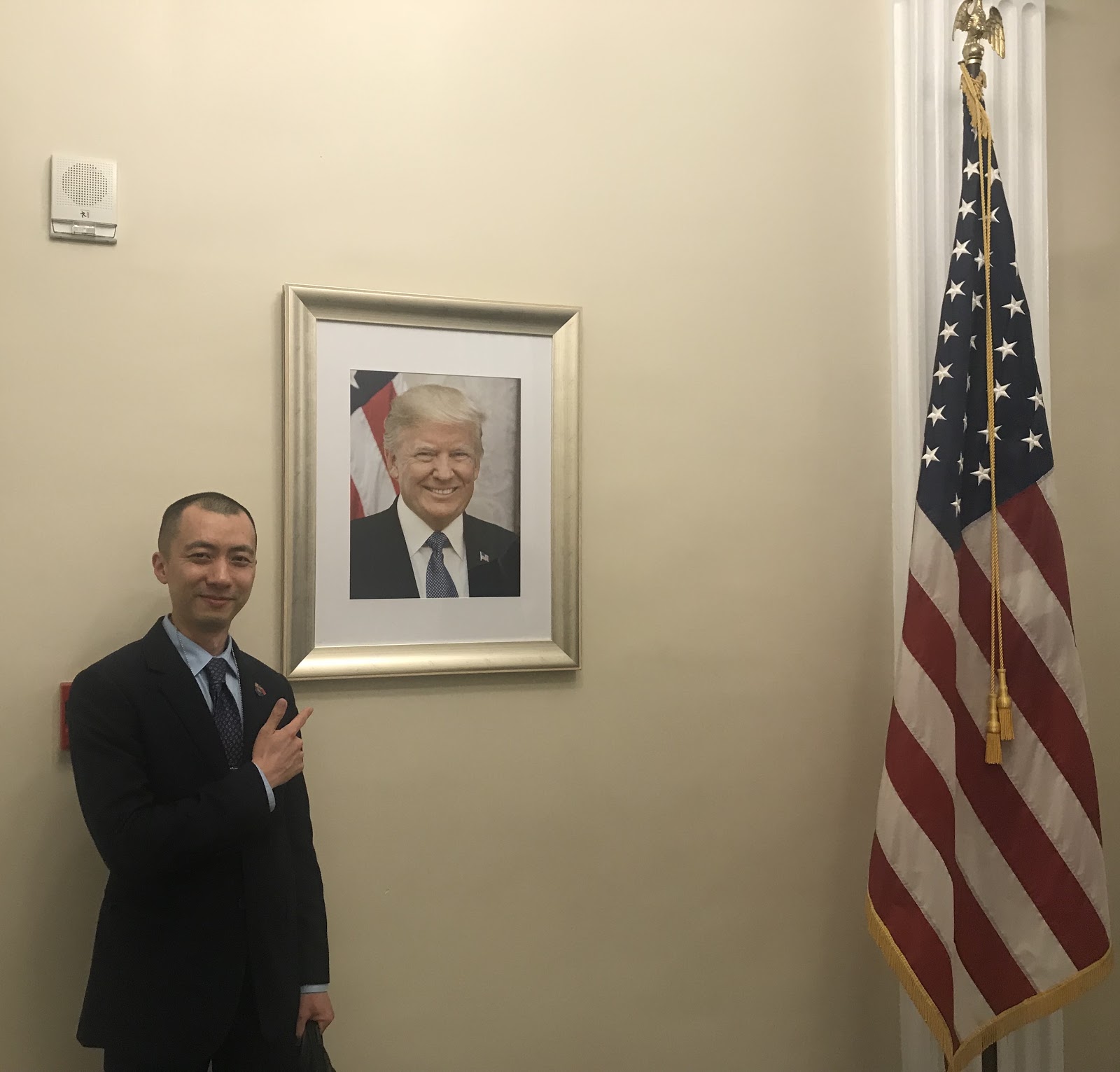Last week, I had the privilege of being invited to attend meetings in Washington DC with members of the White House Administration, Department of Commerce, Office of US Trade Representative, Congress, and Senators to share my views on how the China tariffs are affecting the supply chain of American businesses and especially small businesses.

I was a member of a delegation with the American Chamber of Commerce in Shanghai’s Washington DC Annual Doorknock as I represented the Supply Chain Committee.
Unfortunately, President Trump was in New York and couldn’t meet with us… But we did get to meet with over a dozen key leaders in Washington.

Here’s a recap of what I learned and how it affects your e-commerce business.
The Goal for the US is NOT to shift production out of China.
Many people assume the main goal is to bring the jobs back to the US but I’m afraid that this is not true and the boat has long sailed for much of the manufacturing sector in the US. Allow me to explain.
Key officials of the White House Administration explained to us that the goal is to LEVEL THE PLAYING FIELD when it comes to trade with China.
As you may have heard, China has not been playing by the rules when it comes to trade. Since being accepted into the World Trade Organization (WTO), they have not been abiding by the rules. They have been accused of forced technology transfer, theft of intellectual property (IP), as well as computer hacking among other offenses.
China entered the WTO in 2001 and has had 15 years to get their act together but things have not changed.
In addition, getting equal market access in China is a huge challenge for many foreign businesses including American companies.
Therefore President Trump has decided to use import tariffs as a way to create leverage for the US to bring China to the negotiating table about these issues. These tariffs have gotten Beijing’s attention by hitting them where it hurts. In their economy and their pocketbooks.
What is the impact on e-commerce businesses?
“When Elephants Fights, The Grass Gets Hurt” – African Proverb
The first impact is on the UNCERTAINTY on the supply chain as a whole. Taking a step back let’s break down what a supply chain consists of first. A supply chain consists of raw materials, manufacturing, logistics, and the costs involved to manufacture and ship a product from the country of origin all the way into the hands of the consumer or end user.
The tariffs have cast a cloud of UNCERTAINTY over whether these businesses can continue to profitably source and import products from China. According to a recent survey by Amcham Shanghai of American, 31% of American businesses are considering delaying or canceling investment decisions as a result of these China tariffs.
And it’s not a simple matter to shift manufacturing out of China to Southeast Asia or South Asia. In fact based on the survey of American businesses, it is not happening very much. 64% of the companies surveyed have NOT relocated are NOT considering relocation out of China.
Many feel the goal of these tariffs is to bring jobs back to the US. However according to the survey, only 6% of American businesses are considering relocating back to the US.
When I spoke with a Director of Supply Chain for a US packaging company, he told me that most of that relocation to the US will be in the form of automation and robots – not actual human labor. In other words the jobs created will likely be single-person operators running a factory full of robotic arms and automated equipment. This is not exactly what the administration had in mind in terms of creating jobs.
So when will the tariffs be resolved?
Based on our meetings with Washington policymakers as well as a special meeting with the Consulate General of China’s representative in Washington DC, both sides seem to be deadlocked at this time.

A couple, obstacles are keeping them from sitting down to negotiate.
On the American side, the US is currently enjoying a strong stock market and positive economy so it is not in a hurry to negotiate to lower tariffs. Trump has this leverage behind him in the form of the strong economy and he is happy to use it against China while he can.
China, on the other hand, is feeling that the US is trying to “contain” it and may not respond well to this threat. In fact, Beijing is claiming that it is being “bullied” by the dominant US counterpart.
A former US Trade Representative leader shared with me that this strategy may backfire since members of China’s Party feel they cannot lean towards the US side or even consider their demands or else be seen as a “traitor” to their country. So China is not eager to negotiate either at this time.
In addition, the US midterm elections are coloring everything
The US midterm elections are coming up in November. But word on the street in Washington is that in the Republican party nobody is willing to go out on a limb against Trump at this time.
And among Democrats, nobody is going to defend China.
So it seems these tariffs are not a short-term play.
A White House Administration representative told me that Trump wants a “fundamental change between the US and China.”
So the President is “moving pieces on the board in a dramatic way” through these tariffs.

Another official from the Department of Commerce said that the US is aiming for “short-term pain for long-term gain”.
Other government officials have revealed to me that the focus on issues will not change even if the Trump administration changes. They are prepared to play this out for a long time.
What’s next? $267 Billion
China has retaliated to the tariffs with tariffs on their own on US imports into China. Trump said that if China retaliates then he is ready to levy an additional round of $267 Billion in tariffs. If that passes then essentially all $505.5 Billion of Chinese imports will be hit with the tariffs.
This means that your products almost certainly get hit by the tariffs if they haven’t already.
What are some alternatives to tariffs on the table?
There have been some discussions of a multilateral approach to trade beyond China-US. One of these measures is the “Asia Reassurance Initiative Act” or ARIA.
Other Senate leaders are working on a China Strategy Working Group to seek alternatives to the heavy-handed tariffs being levied now.
It remains to be seen if these alternatives will have any significant impact away leading trade policy away from tariffs.
Conclusion: These tariffs are not going away any time soon.
Be prepared with your supply chain if you’re sourcing from China going forward. I would especially pay attention to your profit margins and decide how or if you can absorb the additional 10-25% in tariffs.
After reviewing how these China tariffs will affect your e-commerce business, next week we will take a deeper dive into how you can prepare your business for the 4th quarter and Chinese New Year.
-Gary
PS: Has your business been affected by the tariffs? If so, I’d like to hear from you. Please fill out this short survey here.
I am new to sourcing products. Would you recommend avoiding China now and looking elsewhere? What about the Canton Fair? Still worth going?
Casey, I wouldn’t rule out China. Most all of products you find on store shelves that you might want to sell are manufactured in China. So if you look elsewhere you might now find the right manufacturer. As to the tariffs it looks like this will be an added cost of doing business at least in the near term. And it will affect all sellers who import from China the same so you wouldn’t be at a disadvantage.
Hope that helps!
Gary